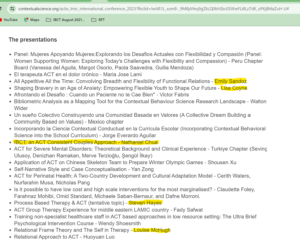Tag: Face-to-Face Counseling
Two Shrinks Over Drinks with Dr. Matthieu Villatte: 15th Anniversary Edition Part 2!
Two Shrinks Over Drinks, 15th Anniversary Edition! Interview with Dr. Matthieu Villatte Part 1
Letting Go to Gain Control
by Nathan Chua
The School Play:
I remember some of the most fun I had back in my school days, was when we had to do role plays. Not just any other role play, but actually create a skit as a medium to learn. There’s also very little pressure as these were done in front of a class only and not a major production wherein a whole auditorium of students were there to watch.
My Louis Vuitton Story:
I once entered an LV store in Metro Manila, and scoured through some of the merchandise. As I was doing that, I noticed the attentiveness of the sales people as there were hardly any people around who were shopping. I looked at some items that I thought were very impressive and their price tags. As I was on my way out, I said, “I love your products but I can’t afford any of them!”
Walking around with plastic buckets:
Have you ever had a time when you and your friends went out and knew that you were all going to do something rather unconventional and at times downright embarrassing? Of course, always in the spirit of good clean fun. Well, I am one of those who has gone out with a group of my high school male friends wearing clothes that should only belong to the home, carrying plastic buckets and brooms, and going inside a mall to deposit the stuff we had at the front of the department store where people usually leave their shopping items.
Ordering a siopao at Mcdo:
When I am in a fast food restaurant, I sometimes order something obviously unserious at the counter. For what reason? Nothing just for fun! As the heading for this paragraph tells you, I have in the past ordered the Jollibee Chicken Joy at a McDonald’s restaurant!
Which leads me to how I got to think about writing something like this for all of you. When I did those I did not know anything about contextual behavioral science. About a couple of weeks ago, I found an online audio resource created by Steven Hayes, the developer of ACT (Acceptance and Commitment Therapy) and RFT (Relational Frame Theory). He shared one of the ways we can pop that bubble or illusion that says we do what we think, by doing exactly what I had been doing sporadically since oh, high school? I hadn’t realized doing these crazy things weren’t just fun, they were also about letting go of some of the rules that we tend to sell our lives to! What I was doing was letting go of the rules that shackled me from pursuing what would be psychologically risky, but at the same time liberating. I can choose to be how I want to be at any given moment!
This article reminds me of my father. He was a good but also misunderstood man. Believe me, I was one of those who did. He had always been a businessman who inherited a family business. Through decades of working in the business, he could not manage to make a sizable profit. He found himself mired in debt until the day he passed. There was one skill that we, his kids, thought that could have made him a world-class cartoonist. We saw some of his drawings of caricatures of his friends with a pen! His every line had a precision that he didn’t need a pencil to make his initial sketch. Awesome talent that was never discovered nor shared with more people because he thought he couldn’t.
Are you living with can’ts, shoulds, musts in your life? Yeah they sure feel safe, but do they make you feel alive? Doing what your mind tells you you can’t, is a part of the exercise towards breaking that bubble. That bubble that says you can’t get out of that family business that is so comfortably limiting. That bubble that says you can’t do this or that. Don’t get me wrong, it is not my intention to tell you that anyone can be anything. We all do have limits. The question is, have you tested the limits and seen how liberating it can be on that side where your mind says no, you can’t. And maybe you can just, by doing these silly things for nothing, be you, and no one else but you!
Is Counseling Really Worth All the Risks? Video!
Listen on Spotify:
Nathaniel Chua’s First International Talk Now on the One Life Only YouTube Channel!
Listen to this on Spotify:
Is Your Funny Valentine Still Around? – Video!
Listen to this on Spotify: https://spotifyanchor-web.app.link/e/8savCQtrUGb
Is Your Funny Valentine Still Around?
by Nathan Chua
Having a long term relationship primarily involves two things. Can you guess what they are? The answer could be as simple as acceptance and change. Just like the lines in the Serenity Prayer by Reinhold Niebuhr, a big part of the work I do in individual, couple, and family sessions can actually come to just these two options as people face challenges in their relationships with themselves and their significant others.
I often ask a few questions to my couples once they get to the feedback session, “If you’ve seen a few of those silver or golden anniversary celebrations, what do you notice is usually part of the ceremony? Do you see the couple face each other and say something about their relationship? What do you often see included in their speeches for one another?” After a few guesses and not hearing what I expect them to say, I would add that couples usually talk about the funnier parts of their history together. In fact, couples call each other by their pet names which, especially in Filipino culture, could be endearingly funny. So the answer to the question is humor.
Why is humor important? Because humor signifies a level of acceptance that couples have for each other, knowing that certain things are difficult for them or their partners to change. It also involves a greater awareness of their benign albeit hidden intentions. If one is messier than the other, the neater partner usually only sees a lazy and defensive partner. But once the messier partner feels accepted while the neater partner sees how much the former is trying their best to keep up with the neatness, the human compassionate side starts to kick in. Because like it or not, your partner will probably forget the way you want the stuff on the kitchen counter to be arranged. In other words, it’s not going to be perfect most of the time.
Acceptance:
Let’s first talk about acceptance and why it could be your road to change. Please note though that acceptance is never something that we can demand from each other nor from ourselves. Here’s a quote from Dr. Andrew Christensen et.al.:
“Change is the brother of acceptance, but it is the younger brother. When acceptance comes first, it paves the way for change,” Christensen, Doss, and Jacobson.
It is understandable for couples to come to therapy thinking that they’re there to follow certain rules about how to change their partners or how to change the way they communicate with one another. Anyway, isn’t this the reason why they came to see a trained counselor in the first place? Well, if you find your counselor providing simple solutions to many of your communication problems, then maybe that’s a sign you might have to go elsewhere. Why? Because those very same simple solutions are probably nothing new to what you are already doing. If psychology was done this way then there is no need for its study. All we would need is some good old common sense. For example, simple solutions like making plans for a partner to pick up their socks when they remove their shoes and put them in the hamper. Couples who agree to these types of interventions usually end up fighting about the rules learned in counseling. It can also breed resentment in the partner who is not sided with by the counselor. Moreover, these are new rules to again fight about. Well, one of you is not following the agreement which means another demand and another source of frustration.
It is through acceptance that what we see in our partners as defects turn into the differences they were between you from the very start. Humor is a big part of this process of accepting that your partner will not be your clone. It is also through acceptance that we humans feel moved to change. When others accept us in all our uniqueness, we find the space to feel compassion when we sense that our partner is accepting us even if we snore too loud at night, or cleaning up after us even when they had a long day at work. That compassion is what can trigger more lasting change. It is self-motivated and not coming from an outside expert who probably doesn’t know the full context of your relationship.
Change:
“If we want things to stay as they are, things will have to change.”
― Giuseppe Tomasi di Lampedusa
The change we are looking for, is a change from within. If you go to a counselor and feel like he or she is taking either side of the equation, then that means your counselor is not doing anything that you and your partner haven’t already tried. Your counselor is just adding another voice to either side of the argument. You go home with a full set of rules that are hard to remember in flight and hard to maintain as old habits are difficult to eradicate. In other words, we slip into our old patterns just like all humans do.
Deliberate change can be done in order to avert cumulative annoyance. When I say deliberate it means that the change is coming from a more mindful partner who is capable of seeing the world behind your partner’s eyes. Knowing your partner’s sensitivities and unique history of past relationships with family, friends, ex-romantic partners and many more is your template to doing things more slowly in the face of challenging situations. In fact, if there is indeed a rule that universally applies to any relationship struggling or otherwise, it is simply to slow down and become more mindful or aware of your differences, sensitivities, context, and ways of communicating.
So slow it down and try to get a wider perspective in the heat of the moment. Remember what you wanted to be when you first said yes to the relationship. Can you say yes to the full package and continue to persevere towards your best aspirations you have for yourself in the context of a long term relationship? You can’t slice your partner in half because they come in one package. You only have to remember what you cared about deeply as you jumped into this relationship. Maybe that holds the key and having a good sense of humor about your differences can be one of those endearing things about your partner.
Invitation to all counselors and therapists!
Attention counselors and therapists from the Philippines. Nathaniel Chua will be one of the speakers in an upcoming conference for therapists from LMIC or Low or Middle Income Countries, sponsored by the Association for Contextual Behavioral Science (ACBS)! He will give a one hour talk about Integrative Behavioral Couples Therapy: An ACT-Consistent Approach for Couple Therapy. He will be the lone speaker from the Philippines.
“Everyone involved in the organising of the conference does so voluntarily. No honorarium is provided. All collected funds will be channelled to DNC training funds and various chapters within developing nations to support future activities within developing nations.”*
Other speakers are Steven Hayes, Louise McHugh, Lisa Coyne, and Emily Sandoz

Here’s the link to the event:
Two Shrinks Over Drinks AGAIN!
In this episode for our series, Shrinks Over Drinks, I talk with Dr. Niklas Torneke, a Swedish psychiatrist who has authored three books in English and more in Swedish. Two of his books in English have been very instrumental in my journey into ACT (Acceptance and Commitment Therapy), RFT (Relational Frame Theory), and behaviorism. He is an authority when it comes to the uses of language and metaphors from an RFT perspective.
I have myself seen how his work has informed me inside the counseling room and how much it helps people see through the veneer of language.
Listen on Spotify!



